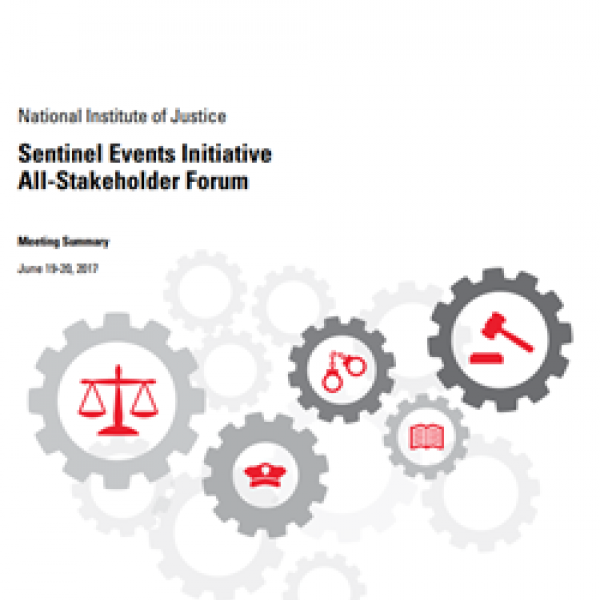In June 2017, nearly 100 federal, state, and local criminal justice practitioners, researchers and academics, policymakers, crime survivors, community representatives, and federal partners convened to discuss learning-from-error mechanisms in criminal justice. The forum aimed to explore the potential benefits of aiding state and local criminal justice systems in developing the capacity for local sentinel event reviews (SERs); discuss how lessons learned from instilling sustainable cultures of safety in the medical and aviation fields might be applied in criminal justice; explore existing research in criminal justice and other related fields; identify aspects of technical assistance (TA) necessary to support local systemwide reviews; and create a shared understanding of common goals and anticipated products from SERs that allow for local variation.
Criminal Justice System and Learning From Error
Forum participants discussed at length the criminal justice system's current approach to sentinel events, SER guiding theories and principles, and the potential benefits of reviews. The following provides a summary of key conclusions:
- The criminal justice system currently addresses bad outcomes almost exclusively through a blaming lens. SERs are a promising alternative for learning from events and preventing recurrences, rather than simply retrospectively assigning blame.
- We must move away from a culture of "bad apples," in which individuals are blamed. Rather, we must recognize that errors are often the result of systemic problems. It is important to give individual system participants the ability to take deliberate action.
- SERs support and inform data-driven analysis. Locally based and oriented SERs may increase perceptions of system legitimacy and promote a culture that values accountability and transparency.
- Analogous industries, such as medicine and aviation, have used SERs to introduce a culture of safety, and can provide valuable lessons in implementing SERs within the criminal justice system.
Recommendations and Considerations
Forum participants put forward a number of recommendations for the Sentinel Event Initiative's TA provider, suggestions for the review process, and guidance on case selection. The following is an overview of the key recommendations and considerations put forward:
- Each SER should be tailored by local stakeholders to local context. NIJ should seek to identify key elements of effective, sustainable reviews and understand how best to empower local jurisdictions to tailor them to their needs and implement them over time.
- Securing the support of local legislators and policymakers will be vital.
- Before a review, all review participants should have a clear understanding of what SERs are (and are not). Processes and procedures must be clearly defined.
- Each jurisdiction must define how it will ensure confidentiality and transparency, and develop a list of essential data points and documents needed for the review.
- A TA provider will play a pivotal role in promoting peer-to-peer learning, ensuring active participation, negotiating group dynamics, and encouraging subject matter experts to participate in a review, as needed.
- SER cases should be carefully selected. Overly recent or politically charged cases should not be reviewed. Cases in which liability has already been determined, and cases that all parties agree constitute a sentinel event should be considered. "Near miss" and "good catch" cases, in which a sentinel event was narrowly avoided, provide valuable lessons.
- The SER facilitator should be carefully selected to ensure the review team members respect the convener in the criminal justice context, and the convener is viewed as largely neutral in the process.
- The SER should be distinguished from blame-focused processes and investigations.
- Participants should be carefully selected, with an effort to promote representation from all ranks, ensure management buy-in, and ensure flexibility in review team composition.
- The role of the media should be clearly defined.
- Each SER should generate published reports, although there was disagreement regarding the extent to which these reports could and should be made public.
- A baseline template would help jurisdictions generate report findings.
Unanswered Questions
The forum left a number of questions unanswered, including how the recommendations generated from the SER will be implemented, how public and transparent reviews should be, and how best to manage liability complications in the reviews. The forthcoming demonstration project will explore these questions, and it will likely provide valuable further insight.


